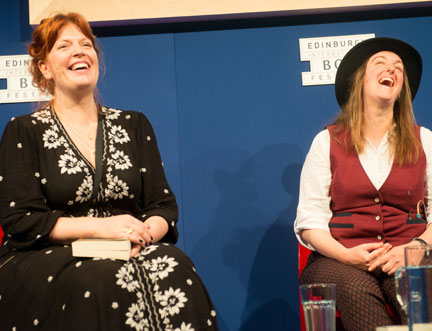More articles Saturday 27 August 2016 3:00pm
Frances Hardinge & Sarah Perry Discuss Feisty Victorian Heroines

The Victorian age may continue to be the favoured playground of contemporary historical novelists but it is still so often misrepresented, whether idealised or dumbed down. It’s not all “top hats, penny farthings, and Jack the Ripper,” said Frances Hardinge, author of The Lie Tree, which won the Costa Book of the Year, the first teenage novel to do so since Philip Pullman in 2001 with The Amber Spyglass. Sarah Perry said she wrote The Essex Serpent, one of the most critically acclaimed novels of the year, to challenge her own unconsciously held ideas about the “feebleness” of late Victorian women: “that they were pulverised by corsets, always fainting, poisoned by arsenic, and waiting for their mutton chop whiskered husbands to come home.”
In a bold and illuminating Book Festival session on Victoriana, landscape, science, photography, and the false dichotomy between faith and reason, Hardinge and Perry discussed their craft with eloquence and humour. Set thirty years apart in the latter half of the nineteenth century, The Essex Serpent and The Lie Tree are also both fantasy novels. The mythical beast of Perry’s book is a serpent, the legend of which she discovered on a car journey through the Essex countryside with her husband. “I wanted to reclaim my country,” she noted, “which has certain connotations that are not commensurate with me.” Perry’s Essex is steeped in the “strangeness of the coast”, “the fields of wheat overlooked by oak trees”, the marshes, pink houses, and pagan traditions. “Not the Essex of TOWIE,” Perry laughed, “though I’m fond of them too.”
For Hardinge, sporting her customary fedora, the idea of “a tree that feeds on lies” came to her on a walk along the Thames as she crossed Richmond lock bridge. She decided to set The Lie Tree, in which a teenage girl investigates the mysterious death of her father off a cliff, on an imaginary Channel island. “I’m a nasty author,” she chuckled. “I do bad things to my characters and take glee in giving them nowhere to run.” She wanted the heroine of her novel, Faith, to be both resistant to her time but also the product of it. “Not some feisty twenty first century heroine in Victorian clothes,” Hardinge explained, “but a little messed up inside, like a bomb waiting to go off.”
A fascinating discussion about religion ensued. Hardinge acknowledged the influence of the biblical Tree of Knowledge on her “tree of lies” and spoke about her decision to make Faith’s father both a natural scientist and a clergyman: roles that may appear opposed to us now but were then sympathetic. “A natural scientist,” Hardinge said, “was simply exploring God’s creation." Perry, who was brought up an “ardent Protestant” in “a religious sect”, agreed that the notion that “faith and reason are antagonistic is pernicious”. She spoke about the Enlightenment being fuelled by faith and about the fact that both novels are set in the mindblown aftermath of the publication of Darwin’s Origin of Species, when religion and evolution were suddenly viewed as being at odds with one another.
Finally Perry and Hardinge disclosed the pain and pleasure of writing. “I have an amazingly rocky relationship with my books,” Hardinge admitted, adding that two thirds of the way through a novel she tends to fall out of love with the story and the rest is like “pulling teeth”. For Perry, whose first novel was “seven years of teeth pulling”, writing The Essex Serpent was pure unfettered joy. “I kept finding myself giggling when withholding information,” she confessed. “I was like, ‘and now I’ll do a cake scene!’ I probably shouldn’t admit to that.”

 Major new partnership with Celtic Connections
Major new partnership with Celtic Connections 

